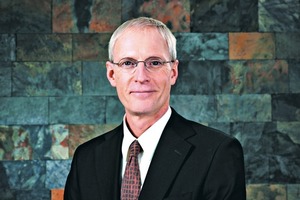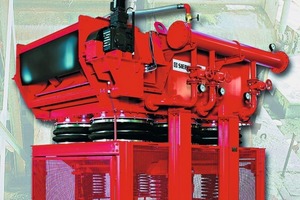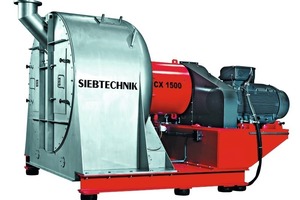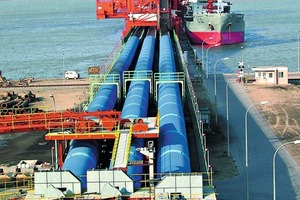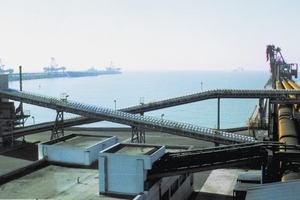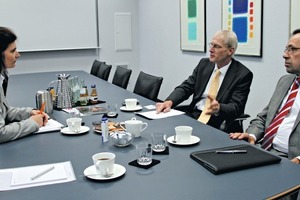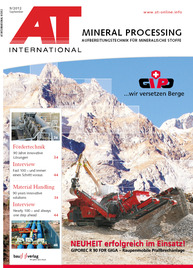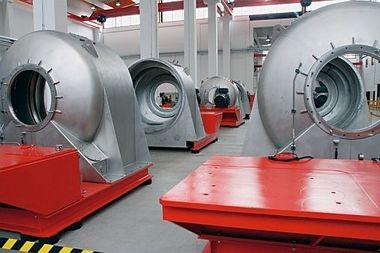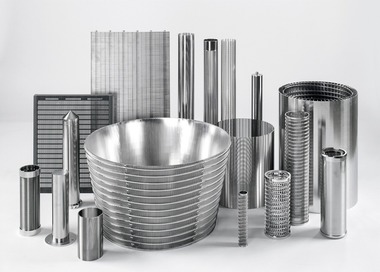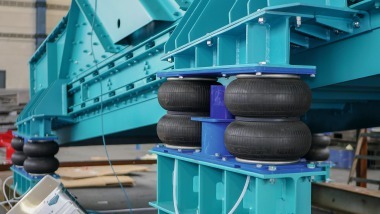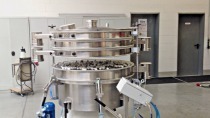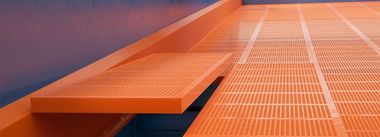Nearly 100 – and always one step ahead
W. Steinhaus & Co. GmbH was founded in Mülheim in 1922, a period in which both the aftermath of the Great War and the first effects of the global economic crisis were clearly felt, and in which no little courage was needed to set up a new company. Wilhelm Heinrich Steinhaus, having previously gained experience as a sales engineer in the field of separation technology, nonetheless resolved on precisely this step. His still young enterprise was renamed “Siebtechnik GmbH“ in 1930. The founding of the first foreign subsidiaries then soon set the scene for the group’s international orientation.
Robert Steinhaus, the founder’s grandnephew, took over management of the firm in 1974, following the death of Wilhelm Heinrich Steinhaus, and it is to him that the group owes the intensification of its international orientation; he laid the foundation stone for the company’s present-day size and global presence. Christian Steinhaus, after completing his studies in economics and gathering initial professional experience, took over management responsibility at Siebtechnik GmbH in 2006, the fourth generation of the family to do so. As of 2009, the group consisted of more than forty companies with 2800 employees around the world, and a turnover of 380 million €. The German parent company has a staff of 230 persons, who achieve annual sales (averaged across the past three years) of some 42.0 million €.
To mark Siebtechnik’s 90th anniversary, Dr.-Ing. Jürg Pollmanns, Technology Director, Günther Liefke, Head of Marketing, and Dr. Petra Strunk, Editor-in-Chief of AT INTERNATIONAL met for an interview covering new developments, current projects and the most important milestones in the history of a company which has grown continuously over the last ninety years.
Dr. Pollmanns: The range consisted then of screen deck covers and complete mechanical screens. Siebtechnik was, at first, a typical mining-requisites supplier here in the Ruhr industrial region. The focus very quickly moved to exports, however, and sales organisations were then set up near the major seaports in the Netherlands and Belgium.
Dr. Pollmanns: In-house production of vibrating screens and vibratory centrifuges for dewatering of coal fines started in 1945. The first Conturbex worm/screen centrifuge followed a short time later. Laboratory-scale machines and comminution equipment were added to the product range soon after this. Then, relatively quickly, came diversification into other sectors. Siebtechnik has always responded extremely promptly to the trends generated by the market, and developed the necessary new machines. The corporate philosophy of developing, designing and producing machines tailored to customers’ needs remains a definitive factor in Siebtechnik GmbH’s success still today.
Dr. Pollmanns: Siebtechnik GmbH is subdivided into three departments, corresponding to the product groups which they each produce.
Department 1 covers mechanical screens and preparation machinery. The largest mechanical screens produced in-house, featuring a twin eccentric-gear drive system, weigh in at 33 t and are used for preparation of ores, coal and stone. This department is also the home of mechanical jigs, which are used for separation of light and heavy fractions in recycling, and for the preparation of sand, gravel and ores.
Department 2 has a significantly broader range of products. On the one hand, it manufactures laboratory-scale machines and analytical equipment, and also laboratory-scale and industrial comminution machines, including jaw crushers, impact mills and hammer impact mills. One special case is the ESM vibrating mill, which is capable of exerting extremely high levels of energy on the product, thanks to its characteristic motion, and is available for carefully selected applications, such as mechanically initiated reactions, for example. ESM vibrating mills have to be designed precisely to match the particular application, due to the complexity of the tasks involved. Department 2 also supplies turnkey sampling systems, mainly for the coal, iron ore and minerals industries. These machines are used in mining, at loading terminals for ships, and also in power-generating and steel plants. The decisive factor in sampling is the necessity to obtain genuinely representative samples that conform to the various international specifications, and that demands a high level of engineering input.
The scope of supply in this context includes sample-taking, conveying, dividing, comminuting, collection and rejects handling. Ultimately, it is very important, if there are disputes and reliable proof is needed, that the supplier of the raw material and the recipient are talking about the same material.
These two departments account together for around 30 % of total sales, in varying proportions, depending on their respective levels of work.
70 % of turnover are earned in the solids/liquids separation sector. Our Department 3 develops and builds continuous centrifuges of all types, and its range thus includes worm/screen centrifuges, pusher centrifuges, vibratory centrifuges, decanter centrifuges, sliding discharge centrifuges, laboratory centrifuges and, of course, combinations of these to meet the needs of our customers and their specific applications.
In 2002, we built a decanter consisting entirely of titanium, for example – that was a real challenge! The customer approached us for this, and our aim at Siebtechnik is always to provide our customers with what they need for their processes.
The centrifuge department is extremely innovative, and continuously monitors the pulse of the market. In 2006/2007, we produced the largest vibratory centrifuge ever, the HSG 1650, for use in the salt industry in Tunisia. Another very up-to-date development is the largest ever worm/screen centrifuge, with a diameter of 1500 mm, which was delivered in 2011 as a pilot order, and was commissioned very quickly on the customer’s site – it is used for potash preparation in China. The follow-up order now involves construction of another forty identical centrifuges, and is to be completed this year – the first machines will be delivered in May, and one will be shown at the Achema process-engineering fair.
Dr. Pollmanns: The development of our centrifuges also started in the field of preparation of coal, ores and salt. The current focuses are on the chemicals and foodstuffs industries, with chemicals as our best sector.
In a lot of applications, dryers – which the group can also supply – are installed downstream the centrifuges, as the next processing stage. The better the performance of the centrifuge, the more efficiently our customer is able to produce, since mechanical dewatering is always more cost-effective than using thermal methods. So every percentage point of moisture removed means savings on thermal energy.
In geographical terms, China is an important focus, very many of our centrifuges are used there.
Dr. Pollmanns: I’ve “only” been with the company for eleven years, so I’ve only experienced just over a tenth of our history! It does make me extremely proud, though, to be part of such a long-established company. This history also shows that the company has manoeuvred and positioned itself correctly again and again. And such a long corporate history naturally also assures continuity, of course.
Dr. Pollmanns: Very often, it’s been a question of having the right instinct for recognising market trends and, indeed, markets, and finding out what systems and what machines are needed in what countries. In this context, we should most certainly also mention skill and good judgement, as far as the setting-up of subsidiaries and making acquisitions is concerned – and that applies to all the companies in our group.
Dr. Pollmanns: Yes, and that is precisely what is special about our group! We have exceptionally short communications routes, and a very direct flow of information to the supervisory board, and this enables our top managers to act extremely quickly – we don’t firstly have to call a meeting of a board on the other side of the planet! And we deal with each other frankly, but in a very civilised manner.
Dr. Pollmanns: One thing is clearly very important – that employees are able to rely on the company management, and the company management on the employees. In other words, the feeling of everyone having the same aim! This has enabled us to develop staff continuity, which is also utterly decisive, given our range of products. We have many special products that quite simply demand experience at numerous levels – for the development engineers, the designers, the technical marketing team, and also our installation specialists. Personal bonds with the company only work if there is a rational atmosphere among our employees at all levels and in all departments.
Dr. Pollmanns: New employees very quickly tune in to the company spirit, more or less from the moment they join us. We very soon notice whether a new employee fits in. Up to now, at least, we’ve always had good judgement. We also have a large number of long-service employees, who’ve been with the company for twenty, thirty or even forty years. The annual celebration, where the “25ers” and the “40ers” are honoured by the management, is a fixed item in our calendar.
Liefke: There’s no written rule, the existing employees simply set the necessary example and that, in my opinion, is the decisive factor. Ours is a family company in the truest sense of the word, and you feel you’re part of one big family – and that’s exactly what gives us our short communications routes and high loyalty.
Dr. Pollmanns: …yes, and this also comes over to our customers, who can thus deal with the same person for years on end – in other words, continuity that benefits the customer.
AT INTERNATIONAL: And how do you achieve this continuity?
Liefke: We’re not dependent on any outsiders, the company is internally financed and investments are made with great care and with a view to the future. We are very thorough in determining what’s good for us and what’s not, and we tend to think long-term; even during the crisis, there were no redundancies.
Dr. Pollmanns: In terms of products, it was undoubtedly the right decision not to remain only in minerals, but also to break into the chemicals industry. In my personal field, production of large-scale mechanical screens is still an important part of the company’s success. The first banana screen was certainly a milestone, like the first worm/screen centrifuges, as well. And the CX 1500 worm/screen centrifuges is definitely another, extremely topical, milestone.
The decision to produce in China for the local market, and to maintain a local service presence as well, was also an important step for us. Another milestone, achieved in the mid-eighties, was the setting-up of our South African affiliate, Multotec, which makes screen deck covers, centrifuges and wear parts that are used in the mining industry everywhere in the resources-rich continent of Africa.
Dr. Pollmanns: We own the company 100 %. There are a few reservations, you need to be aware of the risks, but they are manageable for us.
Liefke: We have our own technology centre where we can test customers’ materials on a range of different machines, which are also used for rentals, and can be set up in the customer’s works for testing. R&D is directly orientated around the customer’s needs, and is continuously driven by his requirements.
Dr. Pollmanns: We’re active throughout Europe, and we also have centrifuge production facilities at direct subsidiaries in the USA, China, Australia and South Africa. Mechanical screens are also made under license in South Africa and India. Tema, in the Netherlands, services the international markets for us, and establishes our products on them.
Dr. Pollmanns: China is an important focus in centrifuges, along with the USA and Europe. We are noticing that very few projects involving large numbers of machines are now being generated in Europe. Australia is also a very important market for us.
Dr. Pollmanns: We intend to expand our operations in China, a start has already been made, with the large order that I mentioned. We look at the “blank spots” on the map and in our product applications, then we’ll persuade the customer to use our products, with all the technological benefits they generate for him. Exports have risen sharply recently, whereas domestic business has dropped back; there can be no doubt that we will continue to need to be able to react flexibly to the markets in the future, too.

